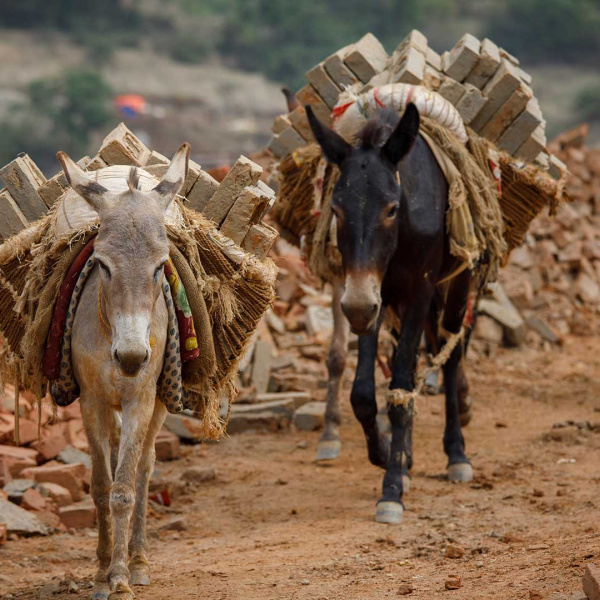International animal welfare charity The Donkey Sanctuary, joined forces with Animal Nepal to provide urgent food and relief supplies to labourers and their working donkeys and mules after they were left stranded in the brick kilns of Nepal, in the wake of the pandemic.
As Covid-19 took hold in March 2020, many residents and workers in the country were left with no time to prepare, as the Nepalese government locked down the country at short notice.
All non-essential services and industries were ordered to close, including the country’s brick kilns, a large number of which are located on the peripheries of the Kathmandu Valley and Dhading in central Nepal.
Donkeys and mules are essential to the livelihoods of some of the world’s poorest communities. More than 200,000 workers, supported by 2,200 working equids, work seasonally in Nepal’s brick industry every year.
Brick kiln workers like Abdul Rahman, 70 were one of many affected by the lockdown. Abdul works in the Bagmati region of the country and the closure of the kiln cut off his and his family’s source of income.
Working in close collaboration with Animal Nepal, The Donkey Sanctuary was able to provide vital help to the animals and workers by providing emergency packages, and by co-funding an intervention with Animal Nepal, government permission to transport and distribute urgent relief supplies to the kilns was granted.
Emergency relief packages containing 25 days’ worth of equine feed, rice, lentil and basic sanitary items for owner households were distributed to 167 families and 901 donkeys and mules within the Lalitpur, Dhading and Banke districts.
Following the delivery of urgent supplies, The Donkey Sanctuary and Animal Nepal worked on transporting the working donkeys and mules from the kilns to Nepalgunj to make sure they were not stranded in brick kilns with little access to food and essential provisions.
Equines are usually transported back to Nepalgunj, where their owners are based, at the end of the six-month brick kiln season in May or June, before the monsoon rains arrive. Here they are left to roam until the season commences later in the year.
As lockdown began to ease, Animal Nepal’s Equine Outreach Programme team were able to travel to the city of Nepalgunj, where they were able to continue to carry out medical checks on donkeys and mules on a one-to-one basis with their owners.
A ground-breaking deal was also struck with the Nepalgunj sub-metropolitan city to provide fresh grazing pasture for brick kiln donkeys and mules during the brick kiln off season. Securing designated grazing lands will help prevent injuries, road traffic accidents and human-equine conflict caused by the animals roaming the streets.
Rich Cobb, Deputy Director of Global Programmes at The Donkey Sanctuary, said: “The closure of the brick kilns left some of the poorest and most vulnerable donkeys, mules and the communities that depend on them, without the means to feed or look after themselves.
“We are proud that through The Donkey Sanctuary’s ongoing work with Animal Nepal, we have been able to respond in this unprecedented time of crisis.”
Pramada Shah, Founder and President of Animal Nepal and one of the trustees of The Donkey Sanctuary, added: “Animal Nepal’s partnership with The Donkey Sanctuary provided invaluable help to the brick kiln workers impacted by the Covid-19 lockdown.
“The lockdown was announced at the beginning of the brick kiln season. As the Covid-19 strain is asymptomatic, the lockdown was imposed immediately, meaning that within 48 hours, the kilns were forced to close and none of the workers could get home.
“We are very grateful that The Donkey Sanctuary was there to help us mitigate the impact of the lockdown, which could have had a devastating outcome for many of the brick kiln workers who were stranded because of it.
“This collaboration has also brought to the fore brand-new shelters, offering working equines a safe, dry place to rest. It has helped educate brick kiln workers on donkey health and welfare, and it has, most importantly, prevented both workers and their animals from going hungry.”
Since the intervention in 2020 Nepal has been subject to a second, more devastating, wave of Covid-19 and The Donkey Sanctuary continues to support the brick kiln communities through its partnership with Animal Nepal.
For interviews, images and information please contact The Donkey Sanctuary press office on 01395 573124 or 07870 849563 (including out of hours) or send an email.
The Donkey Sanctuary is the world's largest equine welfare charity. Our vision is a world where donkeys and mules live free from suffering and their contribution to humanity is fully valued. We run 10 sanctuaries around the UK and Europe, giving lifelong care to more than 7,000 donkeys and mules. Our hospital treats sick donkeys and trains vets both nationwide and worldwide. Our donkey-facilitated learning programme helps vulnerable children and adults develop life skills by connecting with donkeys on an emotional and physical level. The charity operates programmes worldwide for animals working in agriculture, industry and transportation, and those used in the production of meat and skin.
Please note that the name ‘The Donkey Sanctuary’ should not be abbreviated to ‘Donkey Sanctuary’, and the word ‘The’ should always appear with a capital ‘T’ as above.
